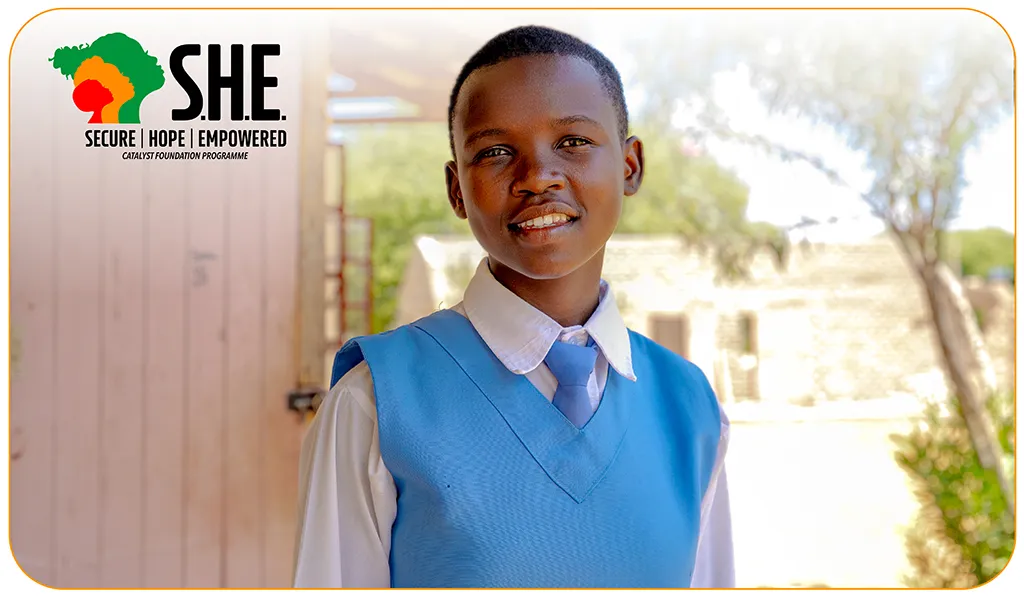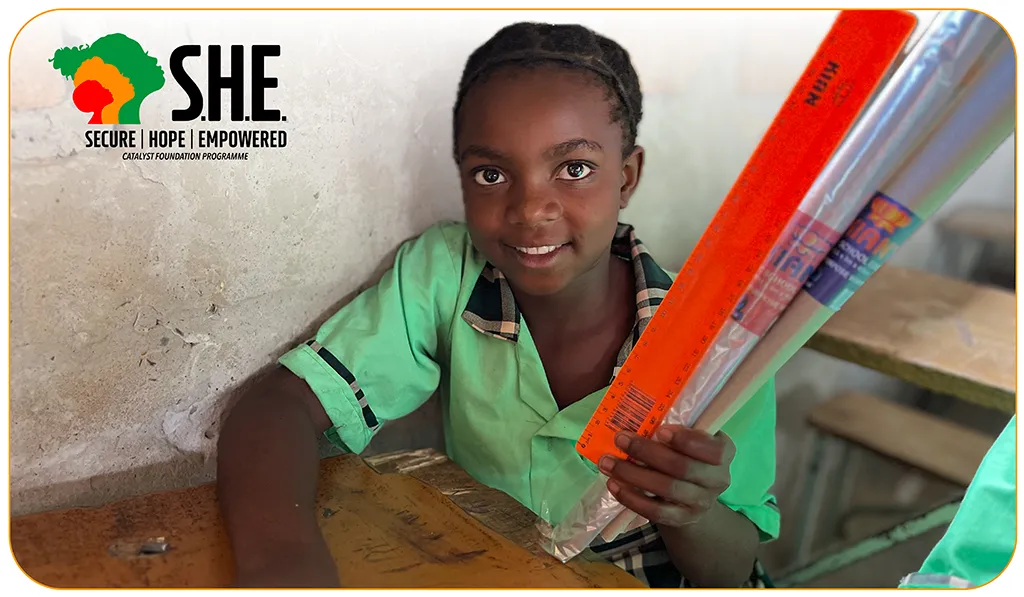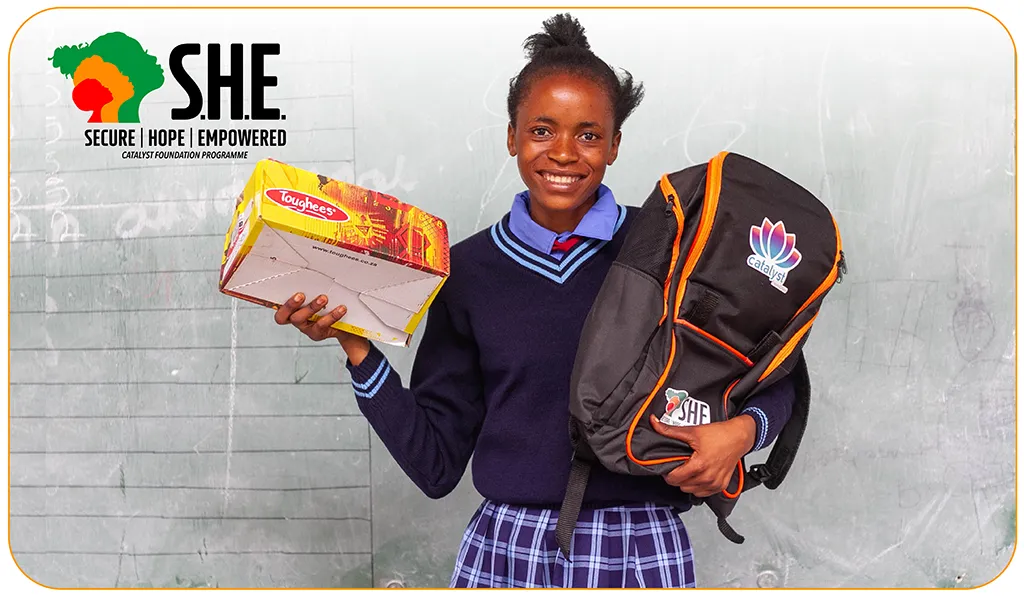We work collaboratively with vulnerable girls across Africa, their families, teachers, and local social services, to break down the barriers that girls in particular face when accessing education.
Our three stages of intentional impact:
Stage 1: Once our beneficiaries have been selected through our ‘Thorough Needs Assessments’, and are inducted into the S.H.E Programme, the aim is for each one of them to start feeling SECURE, due to us removing the barriers that used to prevent them from accessing an education.
Stage 2: After feeling secure, we believe that this will lead to our beneficiaries having HOPE for their futures, as theynow have a future to look forward to.
Stage 3: By the time our beneficiaries reach the end of the S.H.E Programme, the last stage of impact is for them to feel EMPOWERED, ready to take on the world and initiate a positive impact on society.

Our tailored support offered to each beneficiary includes three core pillars of direct beneficiary support, and four additional pillars of school/community support.
Our three Core Pillars of Direct Beneficiary Support includes:
- Ensuring Security – By instilling security within our S.H.E girls, it will allow them to be able to fully focus on their education. Before our beneficiaries join the S.H.E Programme, many of them are vulnerable and insecure in many ways for various reasons. These insecurities turn into barriers that prevent them from being able to attain an education.
The common barriers that make girls insecure in rural communities across Africa include:
- Experiencing harmful cultural practices – belief that girls should not be educated, leading to their involvement in intensive child labour activities, early child marriages/pregnancies and exploitation.
- Being exposed to various forms of abuse – emotional, physical, sexual and neglect, by family members, relatives, or other older men in their local area.
- Facing extreme poverty at home – due to financial constraints, families are unable to afford to send children, especially girls, to school as that money is needed for food and ultimately, survival.
- Being orphaned/living in child-led homes – many girls lose their parents at such a young age and with there being no other relatives to look after them or their siblings, these girls take on the role of parenthood, resulting in them dropping out of school.
- Having no legal documentation – due to being orphaned mostly, girls do not have the required documentation to be registered at a school or be able to write their public examinations.
- Schools being situated very far away from areas of living – long distances are required to travel to school every day, which makes girls vulnerable as they may be abused along the way or they feel extremely tired at school from walking the long distances, preventing them from fully focusing on their education.
Our individual tailored, support plans that we provide to all of our beneficiaries, once they join the Programme, are designed to remove all of these insecurities, allowing them to feel secure.

2. Providing Basic Healthcare – Through our health check examinations and menstrual support, we are able to identify and treat any illnesses that our beneficiaries may have, so that they are able to fully focus on their education, without discomfort.
Since establishing our S.H.E Programme, we have noticed that many of our beneficiaries when they first join the Programme, have never visited a doctor before or have had any medical screenings done. This is often due to their inadequate access to healthcare services and their family’s financial instability.
Our routine health checks that we conduct are a vital part of the support that we offer to our beneficiaries.
The health check examinations that we provide include the following:
- Lung Function Tests,
- ECG (Heart) Tests,
- Weight and Height Checks (BMI),
- Blood Pressure Checks,
- Oxygen Saturation and Pulse Rate Tests,
- Rapid Blood Tests for Diabetes and HIV/AIDS,
- Hearing and Eye Tests,
- Urine Analysis for Urinary Tract Infection identification.
Through these examinations, we are able to identify any health challenges or learning difficulties that our S.H.E girls may be experiencing and with the assistance of medical professionals, we are able to formulate individual support plans, to ensure that all beneficiaries are fit and healthy, ready to continue thriving in the classroom.

In addition to carrying out health checks on our beneficiaries, we also provide them with support concerning menstrual education and hygiene.
With this topic not being spoken about often, many girls who go through puberty and begin their menstrual cycles, unaware of what is happening to them and often, feel embarrassed about their body changes, which forms a barrier to their education, as they would choose to stay home instead. For those girls who do have some knowledge about this, their inability to acquire sanitary products forms another barrier, as they have no protection during their menstrual cycles.
We come in and provide this education to our beneficiaries, and provide them with the necessary sanitary products needed, removing these barriers so that they are able to go to school daily, without discomfort.

3. Promoting Education – Our beneficiaries are extremely passionate about education and their determination to succeed in all that they do is why we are so proud of them. In order to support our S.H.E girls with this passion of theirs, we do everything that we can to remove all the barriers that they used to face, which prevented them from attaining an education.
We provide the following educational support to our beneficiaries:
- Full payment of school fees, extra lessons, and examination fees,
- School uniforms and shoes,
- School bags,
- Stationery supplies, and
- Textbooks/exercise books.
Through our tailored, holistic educational support plans, our beneficiaries are able to continue thriving in the classroom and we look forward to seeing them achieving many great things in their futures!

Our four Pillars of Additional School/Community Support includes:
4. Establishing Family Sustainable Projects – We believe that by supporting and guiding our beneficiaries’ caregivers through their small projects, it will help them become more sustainable and be able to provide more for their entire family, slowly bringing them out of poverty over time.
Whether it is to set up a farming project that grows vegetables, or a poultry project that rears chickens or cattle, or a sewing project where clothes are made to sell – we fully support our beneficiaries’ caregivers ideas, and offer both financial support and guidance to them, to ensure that their proposed project is a success.
5. School Infrastructural Development & Resource Assistance – We listen to all the requests made from the schools that we support, and strive to meet their needs as best as we can.
Some of the schools whom the Catalyst Foundation – S.H.E Programme have partnered with in the rural communities of Zimbabwe and Zambia, are extremely under-resourced/funded, and are in desperate need of support.
As a result of this, the schools’ buildings/classrooms are really run down and are in need of major reconstruction to get them back to a standard that is conducive to dynamic teaching/learning for teachers/students. The classrooms are also really small in comparison to the student numbers.
For some schools, they have to rotate lessons every hour, to allow each class to have lesson time in a classroom, as there is not enough space to accommodate all grades at the same time.
In addition, the school’s resources are also really limited, which disadvantages all students in various ways. Most of the classrooms do not have enough chairs and desks for all students to sit on, their black boards are really old, some have no windows or even a solid roof, to name a few.
In order for us to be able to fully understand each school’s needs, we request a wish list from them, which focuses on their infrastructural and resource needs. Based off these requests, we strive to meet all needs as best as we can, through the support of our partners.
Through our School Infrastructural Development and Resource Assistance support, we hope that over time, we will be able to honour all schools’ requests. If we manage to achieve this, through your support, it will allow all their students to learn in an environment that motivates them to succeed in their studies, and also, have access to resources that will enable them to have broader access to information.
6. Establishing School Feeding Programmes – Providing basic meals daily to all students (boys and girls) at the schools that we support, creates greater impact as it reduces hunger, malnutrition and it improves productivity in the classroom.
Due to the poverty experienced within rural families across Africa, hunger continues to be a major problem for many, as they are unable to eat balanced diets on a daily basis.
Some of our beneficiaries, before joining the S.H.E Programme, sometimes would go two to three days without food, which became a barrier to their education.
Through our holistic support, we remove this barrier by providing food supplies to all of our beneficiaries and their families.
With us offering this support, we have noticed a great improvement has been made in the lives of our S.H.E girls, as many of them were diagnosed with severe malnutrition at the start of the Programme. Fast forward to today, they have now been cleared from this condition and have been deemed medically healthy. In addition to this, our beneficiaries now have the energy to fully focus on their. education, and this has been evident in their academic results.
However, it was noticed that at all the schools that we work with, a large number of the students who were not part of the S.H.E Programme, were suffering greatly from hunger, and this resulted in there being the high statistics of school drop outs and students not arriving to school, as they were unable to physically walk the long distances to school every day, due to their lack of access to adequate nutritional food supplies.
For those students who were able to trek the long distance to their respective schools, when they were in class, they were unable to concentrate and absorb everything that they had learnt. The same applied after their journey back home, as they were unable to complete their homework or study, due to not having enough food within their bodies to sustain them.
In response to all of these issues identified, we decided to implement daily ‘School Feeding Programmes’ in all schools, as part of our additional support that we offer to them.
Once this initiative was established, the impact created was absolutely amazing. All students (boys and girls) are now able to receive a healthy meal every day at school and as a result of this, it has reduced the school dropout rates by nearly 75%, with student attendances greatly improving. The vast majority of students who suffered from malnutrition soon transformed into healthy individuals, and as a result of this support – academic progress from all students improved significantly as well.
The impact created across all schools where our ‘School Feeding Programmes’ have been set up has been very rewarding, and we look forward to seeing this impact grow, where hopefully in the near future, school attendances will be back at full capacity, where no students are hungry and suffering from malnutrition.

7. Education about Climate Change and Environmental Protection – By educating the rural school communities whom we work with about conservation of the environment, we hope that it will lead to a greener future.
“The Environment is no one’s property to destroy; it’s everyone’s responsibility to protect.” – Mohith Agadi
Conservation of the environment is really important to us. This is part of the additional support that we provide to the schools that we work with. We promote this in various ways which include, holding discussion sessions with all students about the need to protect the environment, how to carry this out and what could be done to ensure that they are playing their part.
Through our structured programme, we hope that through our support, it will lead to greener futures!





